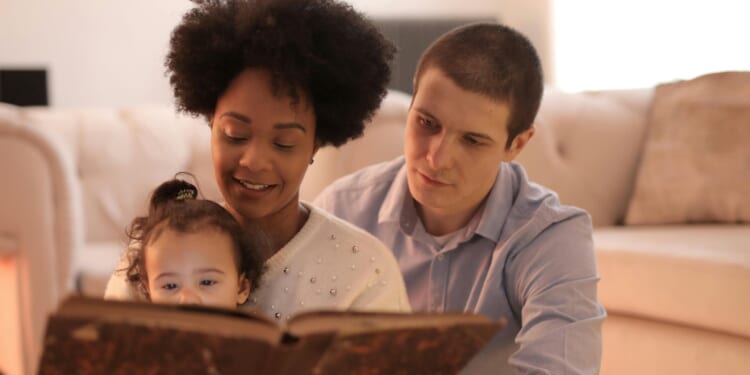Words, words, words!
Babies and young children build the cognitive foundations for the rest of their life during their early years. From birth to age 5, a child’s brain develops more rapidly than at any other time in life and at a rate of 1 million neural connections formed every second. Most adults would do anything to be given a period of five years where they could learn new languages, musical rhythms, and physical skills at that scale. They’d likely have grand plans as to where they’d direct their advanced brain function. But babies experience this rapid growth at a time when they are completely dependent on the adults in their life to give them the appropriate stimuli to learn with.
Parents might not know how to best foster growth in this time period. After all, not every parent is degreed, credentialed, and loquacious. Many parents erroneously think that it might be more beneficial for their children to watch educational television than to learn their vocabulary from conversation with their parents. Many also erroneously believe that literacy will come naturally to their child once they begin kindergarten — and so they put bedtime stories on the back burner.
New scientific research from the Harvard School of Education suggests that literacy strengths and struggles can be measured by brain activity in children as young as 18 months old. Just like painting or playing the violin, there is no specialized learning center in the brain for reading. It’s a skill that many of us take for granted, but it’s actually an intense feat of education — one that’s strongly helped along by the accelerated learning abilities present in young brains — when any of learn to read. The study found that “the bases for reading skills begin to develop in the child’s brain by birth and continue building between infancy and preschool.” Researchers learned that literary skills began to diverge at around 18 months, with some children’s brains began to show signs of developing dyslexia and others showing the foundations of strong literary scaffolding.
Perri Klass, national medical director of the pediatric nonprofit Reach Out and Read, which provides books for families at well-child pediatric visits, emphasizes that family reading is a relational practice that can lead to transformative benefits for children later in life.
We know that the developing brain is shaped most of all by the interactions with the adults taking care of that child…We’re hoping with…the books the caregivers are taking home, the child is learning a motivational lesson: ‘I like books. If I carry a book and give it to my parent, they might sit down and talk to me in that voice’…Your baby wants to be on your lap hearing you read. Your baby will love books because your baby loves you.
In addition to this study, there is an abundant body of research that shows that children’s language and vocabulary skills, cognitive function, and even brain structure is strongly positively related to consistent, two-way conversations with adult caregivers. Reading to a child in their early years can be a deeply fruitful vein of conversation. In many areas, there are programs available that teach parents how to best interact with their children in order for them to grow well.
Literacy is strongly on the decline, leading some thinkers to hail the dawn of the post-literate society. Literacy isn’t just about the delights of Winnie the Pooh or the drama of Grimm’s Fairy Tales. Literate children can understand truth, form an argument, deliberate nuance, and pierce through fictions to facts. In other words, reading to your child and teaching them to read is akin to teaching them how to think. Even reading for ten to fifteen minutes can have measurable benefits. Don’t leave them defenseless.
While local libraries, churches, and community centers are excellent repositories of free books, there are other programs available. Dolly Parton’s Imagination Library will mail children a free book a month from birth until the time when they start school. For parents who wish to up their own literary skills, The Catherine Project offers free online literary seminars on classic books every semester. Hillsdale College also has a large library of free videos that explain seminal texts. Local education programs for adults and children are available through local public schools and community organizations.
It only takes a few minutes a day to lay a strong foundation for a child’s capacity to learn. The reading time that parents spend with their child will be a deeply worthwhile labor of love.










